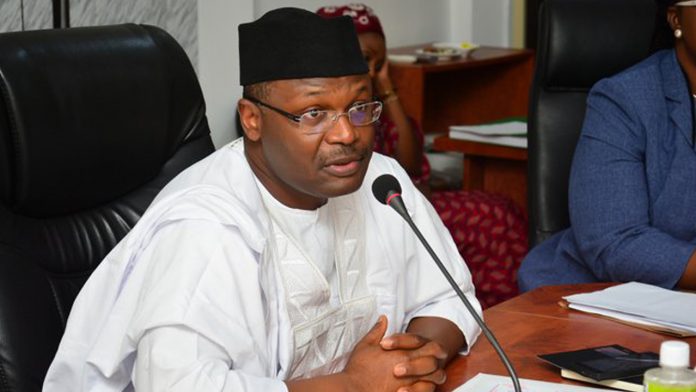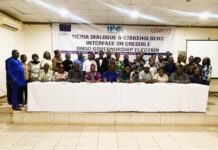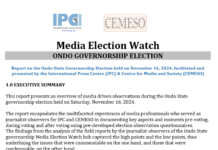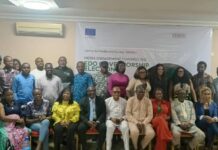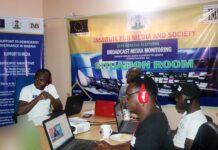The Economic Community of West African States (ECOWAS) has promised to give financial and ‘’every other form of support’’ to the Independent National Electoral Commission (INEC) for the 2019 general elections.
ECOWAS Commissioner for Political Affairs, Peace and Security, General Francis Behanzin, spoke when he led a delegation of the sub-regional body on a courtesy visit to the INEC Chairman, Mahmood Yakubu, promising to send 200 observers for the elections.
Behanzin, noted that the purpose of the visit was to, among other things, find out INEC’s preparation for the 2019 general elections and the challenges confronting it in view of Nigeria’s large voter population of over 80 million.
A statement by the Chief Press Secretary to the INEC Chairman, Rotimi Lawrence Oyekanmi, said Yakubu thanked Behanzin for for his kind words and explained the commission’s preparations for the next year polls.
He informed the delegation that over 14.5 million voters were registered during the exercise between April 2017 and August this year, stressing that the new figure will be added to the almost 70 million citizens already in the national Voter Register after due processes.
On the ECOWAS Network of Electoral Commissions (ECONEC), the INEC Chairman said Nigeria had fulfilled its promises to the body since his election as its President in Cotonu, the Republic of Benin in March 2017.
While identifying finance as the major challenge facing ECONEC, he noted that each member country was expected to pay $5,000 per annum.
In another development, the ECOWAS Court has lamented the high level of human rights abuse in the African continent, particularly the attack on journalists by some governments through their various state apparatus.
President of the community court, Justice Edward Asante, who spoke also called on Civil Society Organizations (CSO) to develop mechanism that would compel government of various countries to comply with the judgment of the court.
The president stated this in Abuja, while receiving a network of lawyers, human rights activists.
The rights activitists came from nine West African countries of Côte d’Ivoire, Ghana, Guinea, Liberia, Mali, Niger, Nigeria, Senegal and Sierra Leone under the auspices of Public Interest Lawyering Initiative for West Africa (PILIWA).
“We know it is a very serious issue in our continent. Even till date, there are governments and presidents still inflicting bad things on their citizenry and it is our duty here to uphold their rights, particularly those of journalists and other people who are being bastardized because they are speaking the truth doing the right thing trying to report government who are doing bad things”, he said.
He said the ECOWAS Court was established initially to tackle issues only between member states but, following the high level of abuse of rights of citizens by governments of member States, the regional body in its supplementary protocol of 2005 expanded the jurisdiction of the ECOWAS Court to now adjudicate on human rights violations in the subregion.
Justice Asante assured that the court will always do its best to deal expeditiously in the interest of justice particularly that of the human rights cases that has brought his guest.
On the issue of disobedience of the orders of the court by government of some member states, Justice Asante remarked that the development of not curtailed now would eventually lead to the death of the court.
He disclosed that so far, only about three or four countries have taking the initiative to enforce the judgment of the Court and in most cases, it is not all the judgments they enforce.
He said: “The court would rely heavily on institutions and civil society organizations to help propagate the ills governments are doing to judgments of the court because the court.
“It is our wish that the civil society, especially professional groups, lawyers, would bear on the governments and various institutions so that they will comply with provisions of the amended protocol, to set up authorities in their governments and legal systems to enforce our judgments.
While noting that the court will be commencing the new legal year with about 106 cases, he disclosed that 12 among them are due for judgment in November this year.
Country Focal Person, PILIWA Nigeria, Barrister Chima Williams, said the group is interested in plans by the Court to take steps towards making provisions for enforcement of decisions which PILIWA can help amplify.
“As we come from different countries in West Africa, it will be our duty to equally talk to our governments to say the rules for this court is due for review. Citizens who get judgments here should have it enforced.
The group believes the ECOWAS Court is key to promoting and protecting human rights in the region, given the strategic roles the court has been playing over the years in bridging the gap in our regional, national laws and judicial systems.
Williams explained that part of the purpose of the groups visit was to urge the court to consider a process of reviewing how it can give more access to communities across the region.
It also wants the Community Court to expand its jurisdictional reach and enforcement mechanisms to guarantee that citizens who look to the court when they are denied access to justice in their national jurisdictions are not left more confused after securing erudite judgments from the court.


